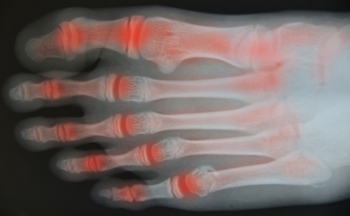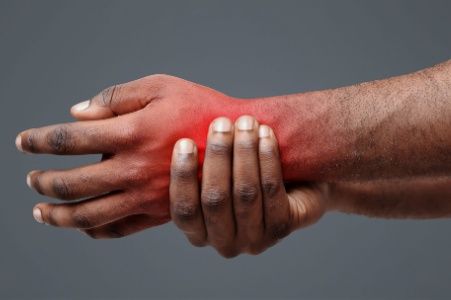
Arthritis is a condition involving inflammation and degeneration of the joints, which can cause pain, stiffness, and reduced mobility. There are several types, including osteoarthritis, which develops from joint wear over time, and inflammatory forms, such as rheumatoid arthritis, that result from immune system dysfunction. Causes may include aging, repetitive stress, previous injuries, genetics, and autoimmune conditions. Common symptoms include joint pain, swelling, tenderness, stiffness, decreased range of motion, and discomfort during daily movement. A chiropractor can help by improving joint alignment, reducing mechanical stress, and enhancing mobility through gentle hands on care. If discomfort from arthritis is limiting your ability to stay active and comfortable, it is suggested that you consult a chiropractor to explore natural relief options.
Arthritis Relief
Arthritis, a common condition affecting millions, causes inflammation, stiffness, and pain in the joints. It can make everyday activities challenging and significantly impact quality of life. While there is no cure for arthritis, chiropractic care offers a natural, non-invasive way to manage symptoms and improve joint function.
Chiropractors focus on enhancing joint mobility and reducing inflammation through gentle, targeted adjustments. By realigning the body and restoring proper movement, chiropractic care can help relieve the pressure on arthritic joints, alleviating pain and stiffness. Adjustments also support better circulation, which may help reduce inflammation around affected joints.
In addition to adjustments, chiropractors often recommend specific exercises and stretches to strengthen muscles surrounding the joints, improving stability and reducing stress on the joints over time. They may also advise on lifestyle adjustments, such as dietary changes or ergonomic modifications, to support overall joint health.
Why Consider Chiropractic for Arthritis?
Chiropractic care provides a holistic approach to managing arthritis, addressing not just the symptoms but also underlying issues that contribute to discomfort. With regular care, many arthritis patients experience improved mobility, reduced pain, and a higher quality of life. Chiropractic care can be an effective complement to other arthritis treatments, supporting a more active, comfortable lifestyle.
What Types of Arthritis Can Benefit from Chiropractic Care?
Chiropractic care can benefit both osteoarthritis and rheumatoid arthritis by focusing on reducing joint strain and promoting better movement.
If you have any questions, please feel free to contact our office located in Omaha, NE .

Elbow pain can develop from a variety of causes and may limit daily activities and arm function. A stiff elbow often results from trauma, such as falls or sports injuries, that damage soft tissues and restrict movement. Previous surgery can also lead to scar tissue and joint stiffness that cause ongoing discomfort. Degenerative processes, including wear of cartilage over time, may reduce joint flexibility and create pain during motion. Inflammatory diseases can further contribute by causing swelling, tenderness, and a reduced range of motion in the elbow. A chiropractor can help by improving joint mobility, addressing surrounding muscle tension, and evaluating the shoulder and wrist for related strain. Gentle manual therapy and supportive care may restore movement and comfort. If elbow pain is affecting work or daily tasks, it is suggested that you consult a chiropractor who can provide effective natural relief and treatment solutions.
Elbow pain can make even simple tasks challenging, often resulting from repetitive movements, strain, or injuries. Conditions like tennis elbow, golfer’s elbow, and nerve entrapment are common culprits, leading to inflammation and discomfort in the tendons or surrounding tissues. Whether caused by sports, work activities, or an accident, persistent elbow pain can hinder mobility and strength.
Symptoms may range from sharp pain and stiffness to numbness or a weakened grip, interfering with daily life. While pain relief methods like rest can help, they may not address the underlying problem.
Chiropractic care focuses on identifying and treating the source of elbow pain. Through gentle adjustments, soft tissue therapies, and targeted exercises, chiropractors relieve tension, improve joint function, and reduce inflammation. This holistic approach helps not only to ease pain but also to prevent future issues, ensuring long-term comfort and mobility.
1. How does spinal alignment affect elbow pain?
Misalignments in the spine can compress nerves that travel to the arm, leading to referred pain or tension in the elbow. Correcting alignment helps relieve this pressure and improve function.
2. How can chiropractic care help prevent recurring elbow injuries?
Chiropractors identify movement patterns or misalignments that contribute to strain and provide strategies to improve mechanics. This reduces the likelihood of reinjury.
If you have any questions please feel free to contact our office located in Omaha, NE .

Mid-back pain is often caused by poor posture, muscle strain, or issues with the thoracic spine. It can make breathing, twisting, or lifting uncomfortable, interfering with daily life. Non-invasive and drug-free care can help ease pain and improve function.
Contact us today for effective mid-back pain treatment.

Carpal tunnel syndrome occurs when the median nerve becomes compressed as it passes through a narrow space in the wrist. This can lead to numbness, tingling, and weakness in the hand. Causes may include a fracture at the wrist that changes the shape of the carpal tunnel, repetitive activity involving the hand that irritates nearby tissues, and pregnancy which may increase fluid retention surrounding the nerve. A chiropractor can help by improving wrist and spine alignment, reducing tension in the muscles and joints, and offering guidance on ergonomic changes that ease strain. If wrist pain or hand symptoms are limiting your daily activities, it is suggested that you consult a chiropractor who can accurately diagnose carpal tunnel syndrome and offer natural treatment and relief solutions.
Carpal Tunnel Syndrome
Carpal tunnel syndrome, or CTS, is a condition caused by compression of the median nerve, which runs through the carpal tunnel in the wrist. This tunnel is a narrow passageway surrounded by bones and ligaments, and when it becomes compressed or inflamed, it can put pressure on the nerve. Symptoms of CTS include tingling, numbness, weakness, and pain in the hand and fingers, often making simple tasks difficult and uncomfortable.
Chiropractic care offers a non-invasive approach to managing CTS by addressing alignment and reducing nerve pressure. Chiropractors start by evaluating the wrist, elbow, and even the cervical spine or neck, as misalignments in these areas can contribute to nerve compression in the wrist. Through gentle adjustments, chiropractors can improve the alignment of the wrist and spine, helping to reduce the pressure on the median nerve.
In addition to adjustments, chiropractors may use soft tissue therapy, such as stretching and myofascial release, to reduce inflammation surrounding the wrist and enhance mobility.
Why Consider Chiropractic for CTS?
Chiropractic care can provide lasting relief by targeting the root causes of CTS, reducing pain, and promoting long-term hand and wrist health.
Can Chiropractic Care Address Repetitive Strain as a Cause of CTS?
Chiropractic care can help manage repetitive strain by improving joint alignment and recommending ergonomic adjustments.
If you have any questions, please feel free to contact our office located in Omaha, NE .
